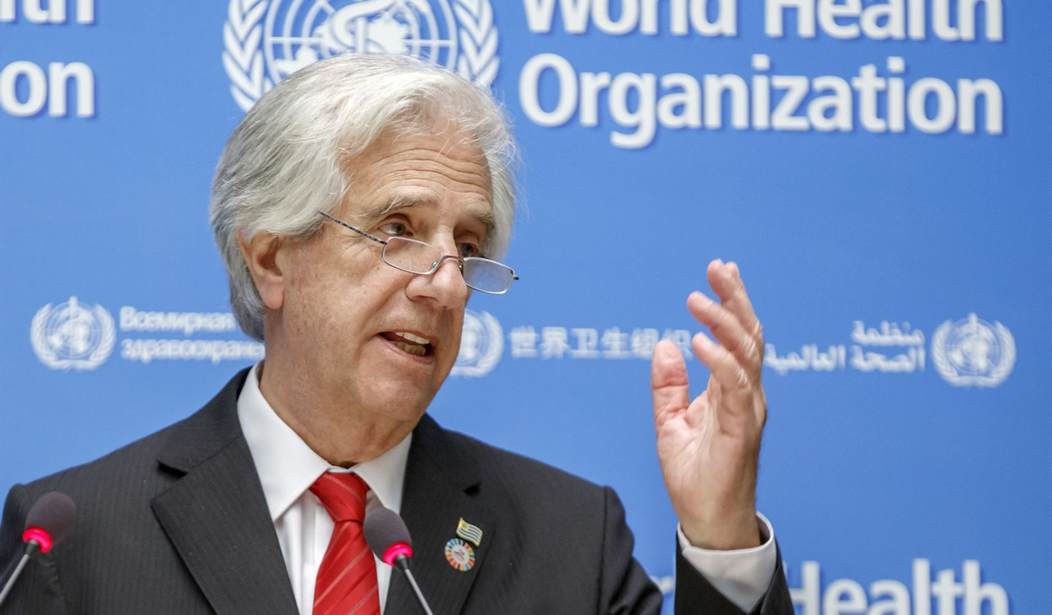The World Health Organization, a subsidiary of the United Nations, has been trying to lead the way on global vaccination policy during the COVID pandemic. They are keen to see as many people as possible be vaccinated and they keep close track of the progress in nations across the world. They are also quick to note how many vaccinations take place and scold more economically prosperous nations for taking care of their own people before sending more doses to less developed countries. But when it comes to vaccination rates and vaccine hesitancy, how well are the people at the WHO doing themselves? How many of them and their staffers have rolled up their sleeves to set a good example for the rest of the planet? We don’t know because they are refusing to tell us. That sort of medical information is “private,” you see. (Associated Press)
The United Nations’ health agency, which has repeatedly urged the world to get vaccinated against COVID-19 and other illnesses, on Friday declined to say how many of its own staffers have followed that advice.
“We won’t have that because it’s confidential,” said Dr. Margaret Harris, a World Health Organization spokeswoman.
Referring to United Nations personnel, U.N. Geneva spokeswoman Alessandra Vellucci said: “We don’t disclose this kind of information. It’s something that is said to the medical service. So, no, unfortunately, we won’t be able to give you these numbers.”
Curiously, after saying that “we won’t be able to give you these numbers,” the Geneva spokeswoman turned around and said she would “look into whether percentages of U.N. staff that had been vaccinated could be provided.” What does that even mean? Either there’s a policy in place or there isn’t, right? Wouldn’t they have gone and checked on the actual policy before coming out and commenting on it?
Or was Ms. Vellucci implying that they wouldn’t be able to give the specific numbers for the WHO but might be able to provide them for the entire United Nations? That seems even less plausible. The only other thing that comes to mind is the possibility that she couldn’t give a raw number but might be able to provide a percentage. But even then, it’s not that hard to find the total number of people employed by the WHO. A percentage would still lead you to the number if you can do basic math.
Far more likely is the possibility that the WHO just doesn’t want the public snooping around regarding their own vaccination rates. If their own hesitancy rate is higher than that of some of the countries they are barking at, their position as the world’s hall monitor is severely undermined. That’s the same thing we see in governments and organizations everywhere these days, though. They are the first to preach to you about the importance of getting vaccinated, tracking vaccination rates, and scolding areas where the numbers are too low. (Unless we’re talking about an area with a lot of minority residents, in which case it’s simply “unfortunate.”) But when you ask them how they are doing in getting everyone vaccinated in their own offices, it’s suddenly personal information.
Isn’t it curious how this all seems to keep playing out the same way? Normally, people’s private medical information is just that… private. People or institutions peering too closely at anyone’s medical situation can be called out for potential discrimination and all manner of other things. In certain cases, you can be charged with violations of the law for doing so. But now, when it comes to a specific vaccination, everyone is supposed to voluntarily make that information very public. Oddly, I’ve yet to be asked whether or not I’ve had my flu shot a single time. The same goes for shingles. (I’ve had both, for whatever that’s worth.)
This sort of hypocrisy is typical all through the United Nations. They love to preach to the world about how much we all have to do to help the less fortunate but they somehow can’t seem to stop their own security forces from raping children in Subsaharan Africa. People in the United States who continue to look to the UN as some sort of global supergovernment that should control the decisions of Americans should really take a step back. Whether it’s decisions about health policy, climate, or trade, every nation controls its own destiny. The United States does more to lift up people in third-world countries than anyone else on the planet. If you want to preach to someone, try going and having a chat with your friends in Iran and North Korea.








Join the conversation as a VIP Member